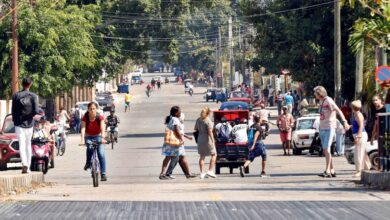The Abdala Vaccine: the Solution To the Pandemic in Venezuela
Abdala, the Cuban Vaccine Against COVID-19, Is Emerging As the Salvation of Cuba and Venezuela.

Although Venezuela is moving forward with its vaccination program with the support of Russia and China, its vaccination rate is very slow. Photo: Freepik
LatiAmerican Post | Santiago Gómez Hernández
Listen to this article
Leer en español: Abdala: la solución a la pandemia en Venezuela
The world is advancing slowly but surely in immunization against COVID-19. And even though Venezuela is moving forward with its vaccination program with the support of Russia and China, its vaccination rate is very slow.
According to ourworldindata.org, as of Wednesday of this week, Venezuela has only vaccinated 1.47 million people. This is equivalent to a little more than 4% of the population, a figure well below countries such as Chile (65%), Uruguay (63%), Argentina (34%) or Brazil (32%); that lead the rankings in the region. The country is even below its other neighbors: Mexico (23%), Colombia (21%), Ecuador (15%), and even Peru (13%). Likewise, it must be clarified that the regime has officially announced that about 11% of the population has already acquired at least one dose.
Also read: This is how the creation of vaccines against COVID-19 in Latin America progresses
This slowness can be associated with its dependence on shipments from Sinovac, Sinopharm, Sputnik V, and, recently, EpiVacCorona, originating from China and Russia. While the other countries in the region have managed to negotiate with many more laboratories, and thus guarantee a constant flow of vaccines in a market characterized by scarcity and competition with powerful economies.
No Donations From the West
In announcements of vaccine donations to the region, Venezuela has also been excluded. For example, recently, the Government of US President Joe Biden announced that it will provide 14 million vaccines free of charge for Brazil, Argentina, Colombia, Peru, Ecuador, Paraguay, Bolivia, Uruguay, Guatemala, El Salvador, Honduras, Haiti, Dominican Republic, Panama and Costa Rica.
Obviously, due to political leanings, the country has been prevented from acquiring contributions from the United States and other G7 member countries, who announced that they will donate one billion doses to other countries.
Covax Troubles
In addition to this, the Venezuelan government has had a series of disagreements with the Covax program. The WHO warned of a debt of the Venezuelan government, which prevented the delivery of the drugs (a debt that, according to the Bolivarian government, has already been paid), but also because Venezuela is asking for a specific vaccine.
ENTREVISTA | @jguaido
"Por soberbia de la dictadura, en Venezuela no ha ingresado una sola vacuna por COVAX. Ni siquiera el 1% de la población ha accedido a las dos dosis de la vacuna"
https://t.co/z7f4PE3NsN pic.twitter.com/z00Djjano4
— 24 horas RNE (@24horas_rne) June 23, 2021
According to the Pan American Health Organization (PAHO), Venezuela requires the Johnson & Johnson Janssen vaccine (single-dose and without the need for super freezers). But PAHO cautions that this will also depend on the availability of the laboratory. This, after the nation, had rejected the arrival of between 1.4 and 2.4 million doses of AstraZeneca for not passing "technical reports" in the country.
Adbala: Salvation
Abdala seems to be a lifeline for the Venezuelan regime. So much so that the Government of President Nicolás Maduro announced the acquisition of 12 million Cuban doses during the coming months, which would be equivalent to 4 million people, since the Abdala needs 2 reinforcements after the first injection.
But, despite the fact that Abdala promises an efficacy (92%) similar to those developed by Pfizer or Moderna, and superior to AstraZeneca and Sputnik, it still has several criticisms. Mainly from within Venezuela, the first "client" of the vaccine.
The Venezuelan Academy of Medicine (AMV) expressed its concern about the arrival of the drug developed in Cuba. According to this entity, the concern is that the vaccine has not yet been verified by international organizations, such as the WHO or the FDA or the European Medicines Agency.
???????? #Venezuela recibió este jueves el primer lote de Abdala, el prototipo de vacuna desarrollado por ???????? #Cuba. Delcy Rodríguez firmó el contrato para comprar al menos 12 millones de dosis. pic.twitter.com/Xj5g75dwZu
— Servicio de Información Pública (@infopublicave) June 24, 2021
The effectiveness has not been verified except by Cuban organizations and the AMV believes that " these two biological agents (Abdala and Soberana 02) are being introduced for purely political reasons in Venezuela."
Even if Abdala or some other Cuban vaccine achieves approval in a short time, this does not represent immediate salvation for the vaccination crisis in Venezuela. As we have seen with other laboratories, Cuba could also have problems in the production and shipment of its drugs.





